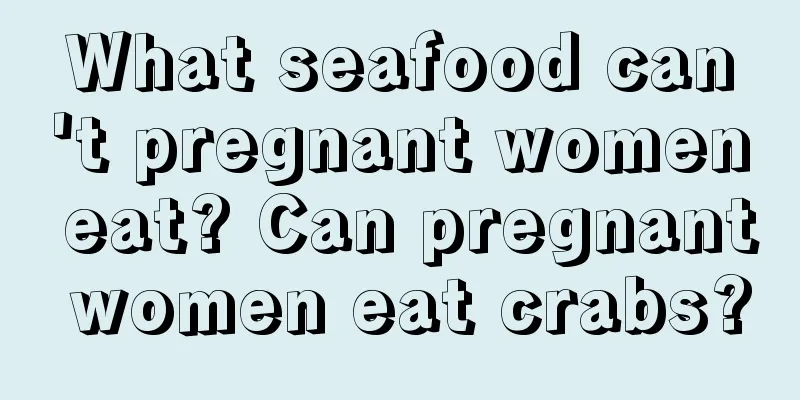What seafood can't pregnant women eat? Can pregnant women eat crabs?

|
Usually pregnant women need to pay special attention to their diet during pregnancy, because there are many foods that cannot be eaten during pregnancy, otherwise it will cause harm to the baby in the belly, and in severe cases it may cause miscarriage. Therefore, we need to understand which seafood pregnant women cannot eat? Can pregnant women eat crabs? What seafood can't pregnant women eat?The first category is crabs. Crabs are rich in vitamins A and E, and contain more calcium, magnesium, cholesterol and other ingredients. They have high nutritional value for non-pregnant people and are a tonic food. But crabs are not good for pregnant women. Especially for pregnant women in the first 1-3 months of pregnancy, eating cold crabs can cause diarrhea at the mildest and miscarriage at the worst. The second category is turtles. Turtle is also called soft-shelled turtle. It is a "tonic thing" in the eyes of many people. It is a treasure all over the body. Soft-shelled turtle has many nutritional benefits. It can not only replenish blood and nourish qi, but also help improve hematopoietic function. For people with dryness in the body, soft-shelled turtle seafood also has the effect of clearing heat and detoxifying. In addition, soft-shelled turtle seafood also has the effect of regulating blood pressure and protecting the liver. Seafood that must be avoided during pregnancy: No matter how much you love to eat, the seafood that must be avoided after pregnancy is soft-shelled turtles and crabs. Crabs are sought after by many professional seafood eaters because of their delicious taste. Especially now that the crab season is approaching, many people's stomachs are ready, but pregnant mothers must be patient again and again. Crabs are cold in nature and have the effect of promoting blood circulation and removing blood stasis. They are very unfavorable to pregnant mothers, especially crab claws, which have a significant effect of inducing miscarriage. If crabs are eaten during pregnancy, especially in the early stages of pregnancy, it can easily lead to bleeding and miscarriage. Can pregnant women eat crabs?Pregnant women should try not to eat crabs, especially in the early stages of pregnancy, because crabs are cold foods that can easily lead to unstable fetuses, gastrointestinal discomfort, diarrhea, and bleeding in the early stages of pregnancy, increasing the risk of miscarriage. Crabs are nutritious and delicious. Although they contain a lot of protein and fat, more calcium, phosphorus, iron, vitamins and other substances, they are a high-protein seafood food that is loved by people, but pregnant women should try not to eat crabs to avoid causing physical discomfort and even affecting the fetus. The reasons are: crabs have the effect of promoting blood circulation and removing blood stasis, which can cause uterine excitement, causing miscarriage or premature birth; crab claws also have the effect of breaking blood and causing miscarriage, which can cause abdominal pain, bleeding and miscarriage. Pregnant women should also eat less cold foods that promote blood circulation and remove blood stasis, such as hawthorn, fungus, river clams, bitter melon, watermelon, cantaloupe, safflower, etc., and eat more high-protein foods, such as milk, eggs, lean meat, chicken, and some fresh vegetables and fruits. Dietary taboos for pregnant women1. Avoid eating large fish. The U.S. Food and Drug Administration recommends that pregnant women should not eat large fish such as swordfish, shark, and mackerel. Canned tuna should not exceed 180 grams. Fish caught from rivers, lakes, and streams may contain bacteria or be chemically contaminated, so it is best not to eat them. If you want to eat them, it is best to send the fish to the relevant health department for inspection. Of course, there is no harm in eating less than 360 grams of fish per week. 2. Avoid eating raw or undercooked meat, and avoid eating raw or undercooked poultry and seafood (such as raw oysters, clams, and sushi). They may contain a large number of bacteria and viruses and must be cooked thoroughly before consumption. In addition, avoid eating undercooked eggs, and make sure fried eggs are fully cooked. 3. Avoid eating cooked food and cold-smoked seafood purchased outside. Listeria monocytogenes is most likely to multiply in cooked food such as hot dogs, ham, turkey, cold meat sauce and sausage, as well as refrigerated smoked seafood. Infection of pregnant women with this bacteria can lead to serious consequences such as miscarriage, deformity or stillbirth. These products must be cooked before eating. 4. Avoid drinking unpasteurized beverages. Do not buy homemade wine or juice from street vendors. These beverages are not pasteurized and may contain bacteria such as E. coli. It is best to check whether they have been pasteurized before drinking. 5. Avoid eating raw vegetable sprouts. Do not eat raw alfalfa sprouts, radish sprouts or mung bean sprouts. These sprouts contain bacteria that may have adverse effects on pregnant women and fetuses. 6. Avoid foods that may cause allergies. If someone in the pregnant woman's family is allergic to a certain food, the fetus will also be at great risk of suffering from food allergies. Therefore, during pregnancy, you should avoid eating foods that are prone to allergies, such as peanuts and peanut products, to reduce the risk of allergies in the fetus. 7. Alcohol can cause fetal hypoxia and affect fetal brain development, and this damage is often irreversible. Therefore, all alcohol should be included in the fasting list. In addition, drinking too much tea will make the baby thin and weak, so it is better not to drink tea. Can pregnant women eat beef?Yes. Nutritionists recommend that pregnant women should eat lean beef 1-2 times a week from the beginning of pregnancy to the end of pregnancy, and the amount of each serving should range from 60 to 100 grams. Pregnant women's demand for iron and zinc is 1.5 times that of ordinary people, and every 100 grams of beef tendon contains 3 mg of iron, which is about 10% of the recommended amount of iron during pregnancy; it contains 8.5 mg of zinc, which is about 77% of the recommended amount of zinc during pregnancy, and its nutritional value is higher than that of general natural foods. Therefore, pregnant women can greatly meet their needs for iron and zinc during pregnancy by eating beef. Beef contains a lot of rich iron, which can help pregnant women effectively prevent iron deficiency anemia. In addition, eating more beef during pregnancy can also help pregnant women improve their immunity. |
<<: Is baby eczema caused by heat? What does baby eczema look like?
Recommend
Can pregnant women eat Gorgon fruit cake? Be careful not to eat too much
Pregnant women can eat Gorgon fruit cake. Gorgon ...
The four characteristics of strong male fertility are easy to conceive
First, if you exercise regularly, your chances of...
How long after induced labor can a pregnant woman have sex? At least this long
Induced labor is harmful to women's bodies an...
Child safety seat ranking: Which brand of child safety seat is good?
Child safety seats are a must-have for families w...
How to cultivate good character habits in children from an early age
The development of babies before the age of three...
Are thin diapers better or thick ones? Thin ones are more comfortable and absorbent.
Diapers are something that a baby must use as soo...
What should parents do when their children complain about unfairness?
The two children have been fighting over everythi...
How is water birth? Is water birth painless?
There seems to be a new way of giving birth calle...
Reasons and measures for picky eating in young children Disadvantages of picky eating in children
Many children have the problem of being picky eat...
Can pregnant women eat peanuts? Taboos for pregnant women before delivery
In daily life, many pregnant mothers are prone to...
Can old hen soup reduce milk production? Can eating old hen reduce milk production?
Chicken has always been regarded as a top-grade t...
What should I prepare before giving birth? What kind of check-ups should I have before giving birth?
The tension before delivery is caused by the fear...
Can the baby sleep with mom and dad? Where is the best place for the baby to sleep after birth?
Many parents are confused after their babies are ...
Can pregnant women eat pig blood? It helps to replenish blood
Pregnant women can eat pig blood. Pig blood conta...
When is it best to shave the baby's hair if the baby is over three months old?
Many people say that it is time to shave the baby...









